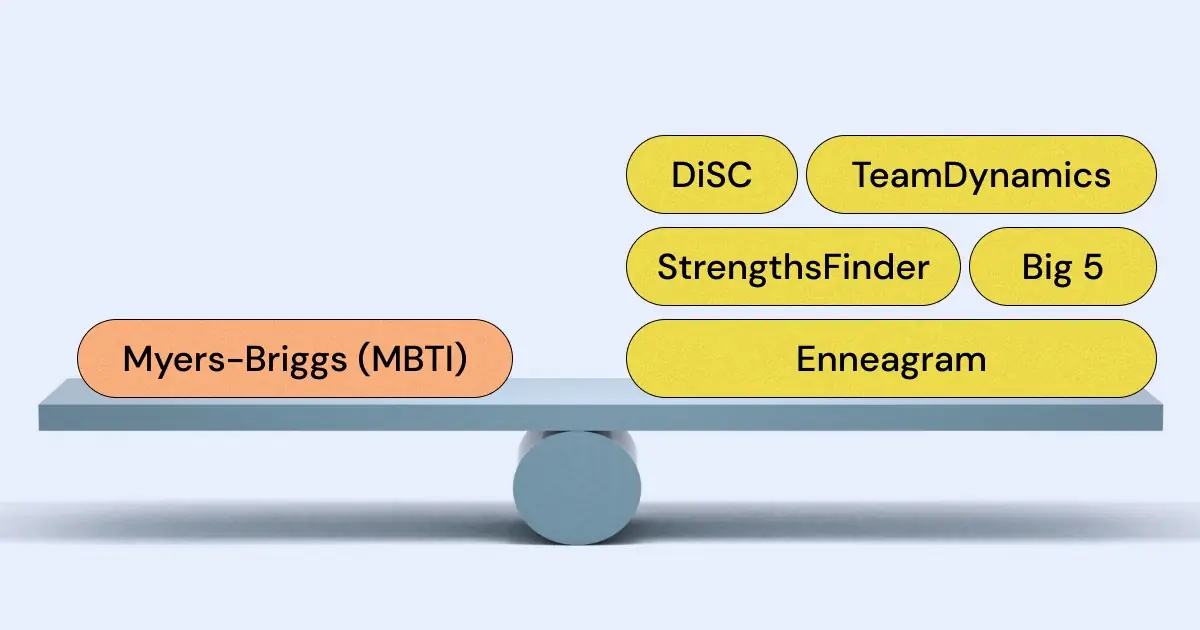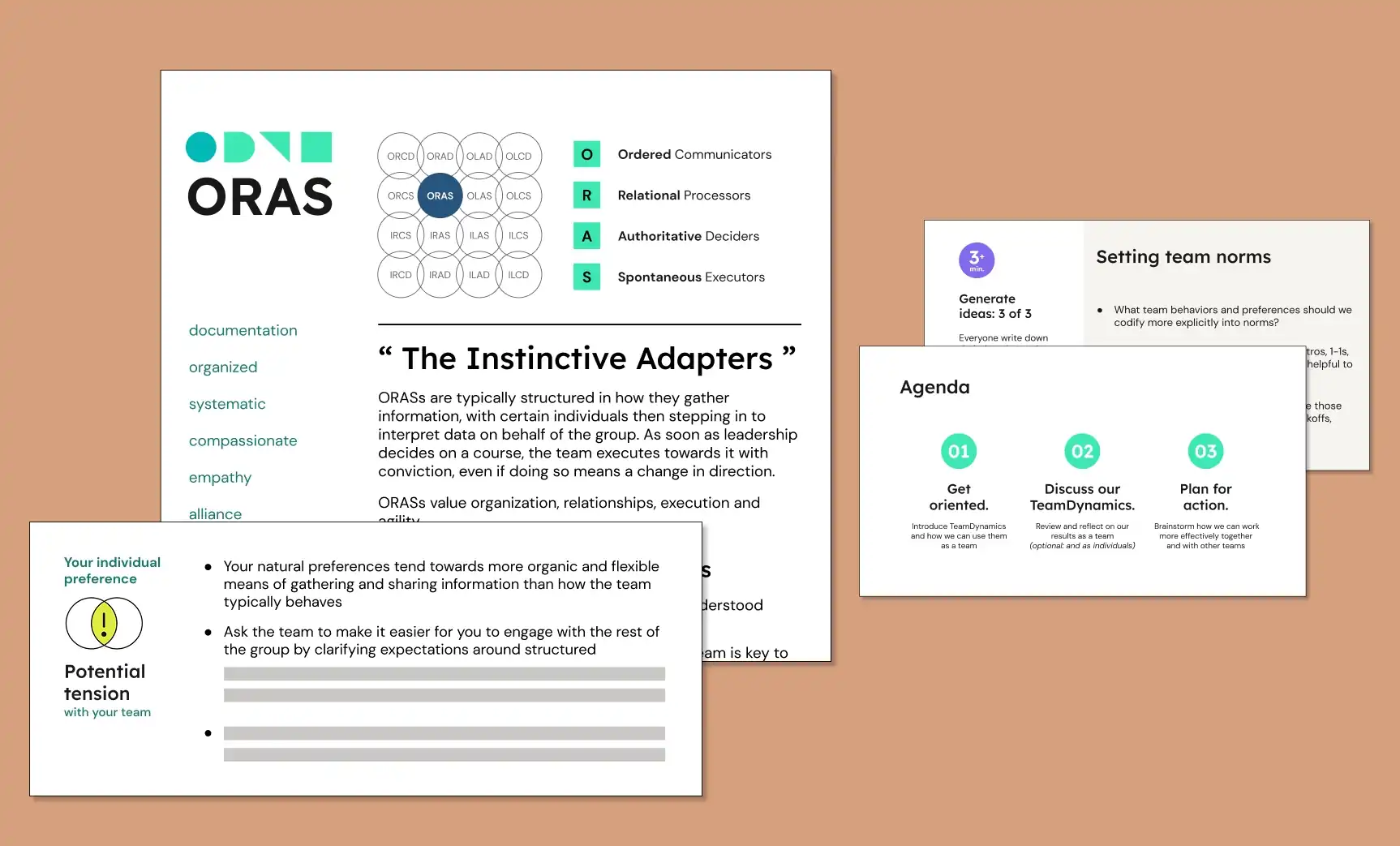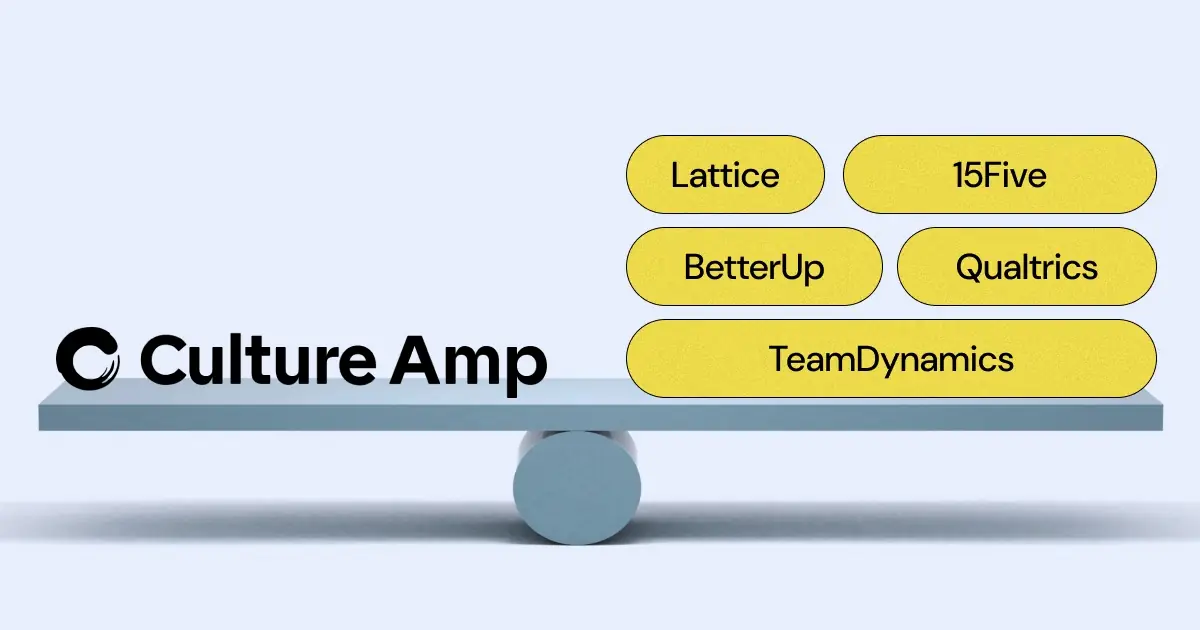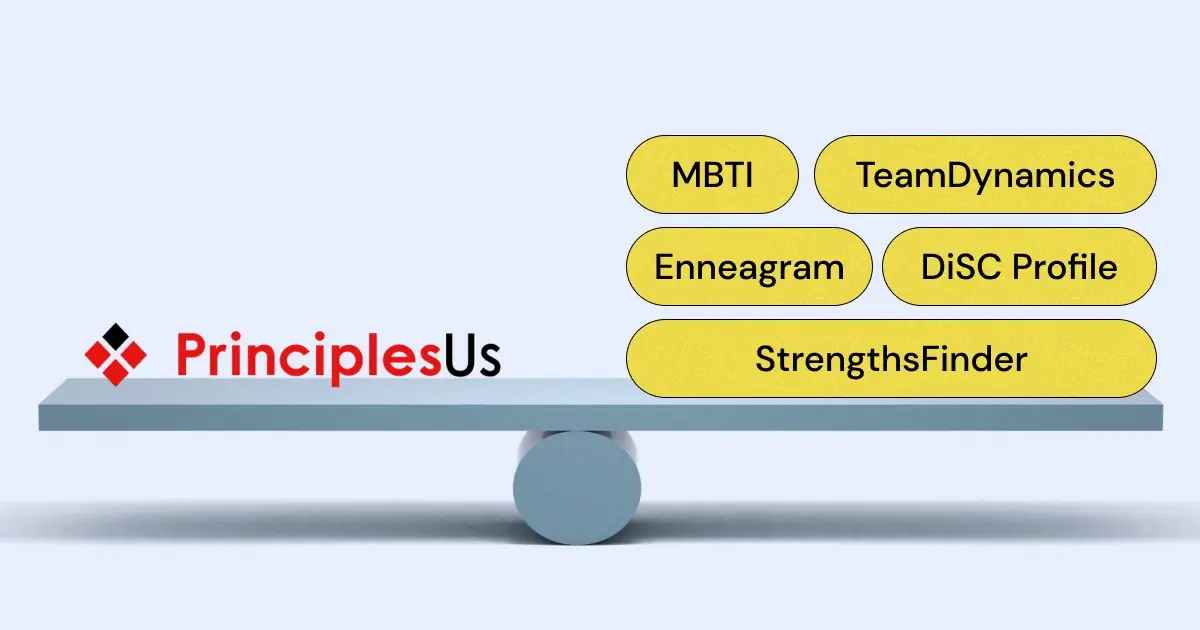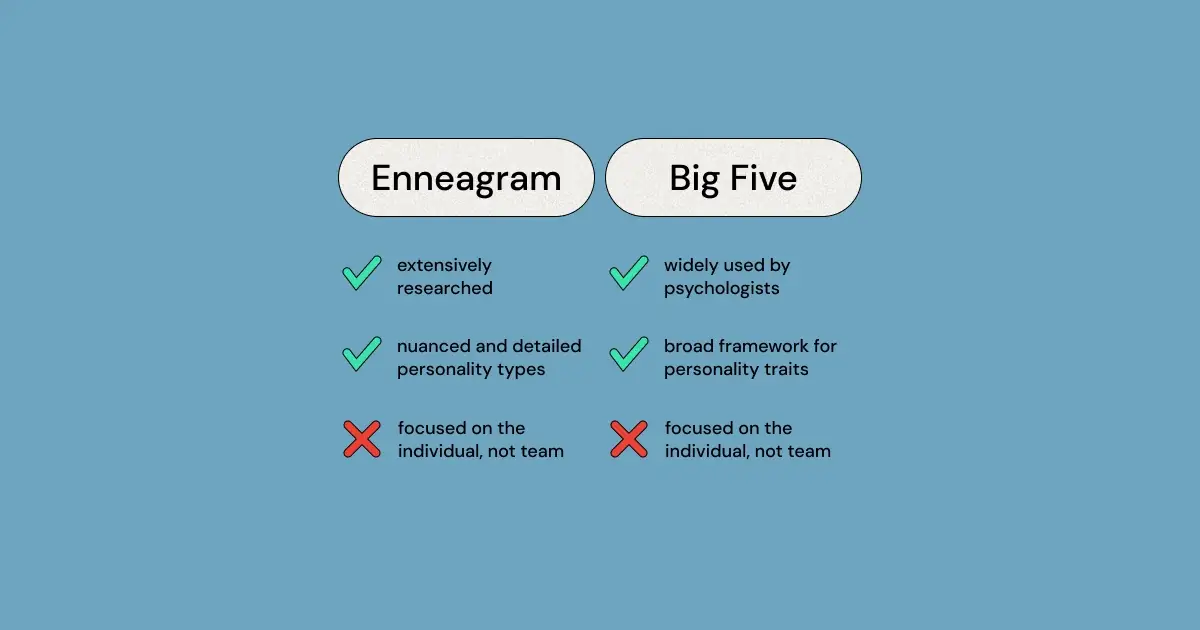Are you looking to understand the unique personalities in your team? You’ve probably heard of the Myers-Briggs Type Indicator (MBTI) or maybe even taken the MBTI test online yourself. It’s a well-known tool that many people use to discover their personality types. But what if there are better options out there? What if there are tools that not only identify personality traits but also highlight how these traits interact within a team setting?
In this blog post, we’ll explore the top 5 alternatives to MBTI that offer new insights into team dynamics. Each of these tools provides a unique perspective, helping you see not just the individual personalities in your team, but also how these personalities work together to form a cohesive unit.
Alternative #1: StrengthsFinder (aka Gallup CliftonStrengths)
While MBTI explores the ‘how’ and ‘why’ of your team members’ interactions and approaches, StrengthsFinder zeroes in on the ‘what’ of their talents, offering a clearer and more actionable path to team success.
Have you ever wondered why some team members excel in brainstorming sessions while others shine in detailed project planning? While the Myers-Briggs Type Indicator (MBTI) provides some insights, StrengthsFinder (CliftonStrengths) offers a more practical approach.
Understanding Team Roles with StrengthsFinder
StrengthsFinder identifies 34 talent themes and helps team members discover their top strengths. This tool explains why some team members thrive in innovation (like those with Strategic strengths) or why some excel at maintaining harmony (like those with Relator strengths). Understanding these strengths can help you assign roles, anticipate conflicts, and leverage talents within your team.
Why StrengthsFinder is a Good Alternative to MBTI
While MBTI categorizes individuals into 16 personality types, it often feels too broad and theoretical. StrengthsFinder, on the other hand, offers a more detailed and actionable understanding of individual talents. It goes beyond personality traits and focuses on what your team members are naturally good at, making it easier to apply these insights in a work setting.
Want to use StrengthsFinder for team building? Check out our free CliftonStrengths team building workshop download!
StrengthsFinder in Action
Imagine you’re assembling a project team. With StrengthsFinder insights, you can pair a team member with Analytical strengths with another who has Ideation strengths to balance detail orientation with creativity. It’s about creating a team where strengths are recognized, celebrated, and utilized effectively.
{{inline-cta}}
Alternative #2: DISC Assessment
DiSC offers a practical lens to view your team. It’s a vital tool in team analysis, providing insights that complement and surpass what MBTI offers.
Welcome to the DiSC Assessment, where understanding your team’s behavior is as easy as ABCD. DiSC stands for Dominance, Influence, Steadiness, and Conscientiousness. This tool focuses on how people act, especially in team settings, providing a clear roadmap to navigate your workplace’s diverse behavioral landscapes.
Behavioral Insights with DiSC
Picture being able to predict your team’s reactions under pressure or knowing who will take charge in a crisis. DiSC makes this possible by categorizing team members based on their behavior. This is crucial for planning projects, creating communication strategies, and resolving conflicts. For example, ‘D’ individuals are your go-getters, often taking the lead, while ‘S’ types are your reliable rocks, ensuring stability and calmness.
DiSC vs. MBTI
While MBTI categorizes people into 16 personality types, it can often feel overly complex and theoretical. DiSC provides a simpler and more actionable understanding of behavior. It goes beyond personality traits to focus on how your team members naturally behave and interact. This is essential for managers and team leads who need to understand team dynamics at a detailed level to guide their teams effectively.
Want to use DiSC for team building? Check out our free DiSC team communication workshop download!
Practical Application of DiSC
Imagine leading a team with a tight deadline. A ‘C’ type’s attention to detail combined with an ‘I’ type’s optimistic influence can drive the project forward while maintaining quality. Understanding these behavioral patterns helps in creating teams that are not only skilled but also behaviorally compatible.
Alternative #3: TeamDynamics
TeamDynamics is designed to understand and optimize team dynamics, making it an essential tool for any leader or HR professional looking to build a successful, cohesive team in today’s fast-paced professional world. Don’t just build a team—build a high-functioning, harmonious team with TeamDynamics.
Discover TeamDynamics, the personality test specifically designed for modern teams. Unlike other tools that focus primarily on individual traits, TeamDynamics is crafted for team settings. Think about it as the go-to personality test for team building, aimed at fostering understanding and collaboration in modern professional environments.
Why Choose TeamDynamics?
TeamDynamics isn’t just another personality test. It’s a revolutionary tool that combines the best aspects of traditional personality assessments with a unique focus on team synergy. By evaluating how individual personalities mesh together to create their team's core behaviors (its "team personality), TeamDynamics provides actionable insights crucial for building high-functioning and harmonious teams.
Want to see a sample of what you get with TeamDynamics? Download a preview of TeamDynamics today!
TeamDynamics vs. MBTI
While MBTI categorizes individuals into 16 personality types, TeamDynamics offers a more practical and team-oriented approach. It looks at the whole team to understand how group members communicate and collaborate. It’s not just about knowing individual strengths; it’s about understanding the unique behavioral traits of the group to enhance overall team performance and collaboration.
The Special Sauce of TeamDynamics
What sets TeamDynamics apart is its emphasis on real-world applicability. It offers a practical toolkit for team leaders to identify areas where the team can improve. This is crucial in environments where teamwork and collaboration are key to success, such as in tech and consulting industries.
Real-World Impact of TeamDynamics
Imagine leading a tech product team. With TeamDynamics, you can identify team norms and practices that need improvement, fostering a team that’s not only talented but also perfectly in sync. TeamDynamics stands out as a cutting-edge tool tailored for modern teams, offering insights that go beyond traditional personality assessments.
Alternative #4: The Big Five Personality Traits (Five Factor Model)
The Big Five Personality Traits offer a comprehensive and nuanced view of individual personalities, making it a robust tool for understanding and optimizing team dynamics. It goes beyond the surface, providing insights into the core drivers of behavior, which are crucial for effective team building and management.
The Big Five Personality Traits, also known as the Five Factor Model, is like the Swiss Army knife of personality assessments—versatile, reliable, and comprehensive. This model breaks down personality into five key traits: Openness, Conscientiousness, Extraversion, Agreeableness, and Neuroticism, often remembered by the acronym OCEAN.
In-Depth Insights with the Big Five
Think of the Big Five as a high-definition map of human personality. It doesn’t just skim the surface; it dives deep. This model helps you understand not just how team members act, but why they act that way. For example, someone high in Openness might be your go-to person for innovative ideas, while a team member with high Conscientiousness could be the one who keeps projects on track.
Big Five vs. MBTI
While MBTI categorizes individuals into 16 personality types, it can often feel limited and overly theoretical. The Big Five offers a broader, more detailed view of personality. It focuses on core traits that drive behavior in various situations, providing a wider lens that is invaluable for managers seeking to build well-rounded teams and foster an environment where everyone’s natural tendencies are acknowledged and utilized.
Want to use the Big Five Personality Traits with your team? Download our free Big Five team building workshop!
Applying the Big Five in Teams
Imagine planning a new initiative. You’ll want team members who score high in Extraversion to champion the project and those high in Agreeableness to ensure team harmony. The Big Five doesn’t just help in assigning roles; it helps in creating a team culture where everyone’s natural traits are respected and harnessed for collective success.
Alternative #5: Enneagram
The Enneagram offers a richer and more nuanced view of personality by focusing on underlying motivations and fears. This deeper understanding is crucial for building cohesive teams and fostering a supportive work environment. It provides insights that go beyond surface-level traits, offering a path to personal and professional growth.
Welcome to the world of the Enneagram, where understanding personalities goes beyond traits to uncover deeper motivations and fears. Unlike MBTI, which categorizes people into 16 types, the Enneagram offers nine distinct personality types, each providing profound insights into what drives behavior.
The Enneagram’s Deeper Insights
Think of the Enneagram as a psychological map that not only identifies how team members behave but also explains why they behave that way. For example, Type 3, the Achiever, is driven by a desire for success and recognition, while Type 9, the Peacemaker, seeks harmony and avoids conflict. This model helps you understand core motivations, leading to more empathetic and effective team management.
Enneagram vs. MBTI
While MBTI focuses on categorizing personality traits, it often feels static and superficial. The Enneagram, on the other hand, dives deeper into the core motivations and fears that shape behavior. It offers a dynamic framework that can evolve with personal growth, making it more adaptable and insightful for understanding team dynamics.
Want to use the Enneagram for team building? Try our free Enneagram team building workshop!
Practical Application of the Enneagram
Imagine you’re leading a team facing a challenging project. Knowing that a Type 6, the Loyalist, excels in creating contingency plans, or that a Type 7, the Enthusiast, brings creativity and enthusiasm, allows you to leverage these strengths strategically. The Enneagram helps you build a team where each member’s deeper motivations are understood and harnessed for collective success.
Comparing the Top 5 Alternatives to MBTI
So which of these alternatives to Myers-Briggs is the right solution for you and your team? Take a look at this comparison table to find out at a glance!
| Tool |
Primary Focus |
Pricing |
Best For |
Key Strengths |
| StrengthsFinder (Gallup CliftonStrengths) |
Individual Talents |
One-time Payment |
Individuals seeking actionable insights into strengths |
34 talent themes, practical for individual development |
| DiSC Assessment |
Behavior and Communication Styles |
Subscription/One-time Payment |
Individuals focused on communication and behavior insights |
Clear, practical for workplace settings |
| TeamDynamics |
Team Synergy |
One-time Payment |
Organizations focused on team performance and cohesion |
Assesses entire team dynamics, focuses on collaboration |
| Big Five Personality Traits (Five Factor Model) |
Comprehensive Personality Traits |
Free/One-time Payment |
Individuals needing a scientific, detailed personality framework |
5 broad traits, reliable, great for team compatibility |
| Enneagram |
Core Motivations and Fears |
Typically Free/One-time Payment |
Individuals focused on personal and professional growth |
Nine personality types, deeper understanding of motivations |
Conclusion
As we wrap up our exploration of the top 5 alternatives to MBTI, it’s clear that understanding team dynamics requires more than a one-size-fits-all approach. From the comprehensive insights of the Big Five Personality Traits to the behavioral focus of the DiSC Assessment, each tool offers unique perspectives on team dynamics.
Want to hold a team building workshop using MBTI? Check out our free downloadable MBTI team building workshops!
While MBTI categorizes individuals into specific personality types and provides valuable insights into personal preferences, TeamDynamics emerges as the real game-changer. TeamDynamics blends the best aspects of methodologies like StrengthsFinder and the Enneagram, focusing squarely on how team members interact and complement each other. This makes TeamDynamics the top choice for elevating team performance, especially in tech and consulting sectors.
By prioritizing team synergy and understanding the dynamics of team interactions, TeamDynamics goes beyond the individualistic approach of MBTI. It offers a comprehensive view of how to harness the unique strengths and behaviors of each team member to create a cohesive, high-performing unit. For anyone looking to enhance team performance and collaboration, TeamDynamics stands out as the superior option.
Remember, the key to a successful team lies not only in understanding individual strengths but in harnessing these strengths to create a cohesive whole. Take the knowledge from these personality assessments and apply the insights from TeamDynamics to watch your team transform into a more dynamic, productive, and unified entity.
Explore TeamDynamics today and experience the difference it can make in unlocking your team’s full potential. With the right team dynamics, even the most ambitious goals become achievable realities. Start your journey towards a high-performing team with TeamDynamics now.


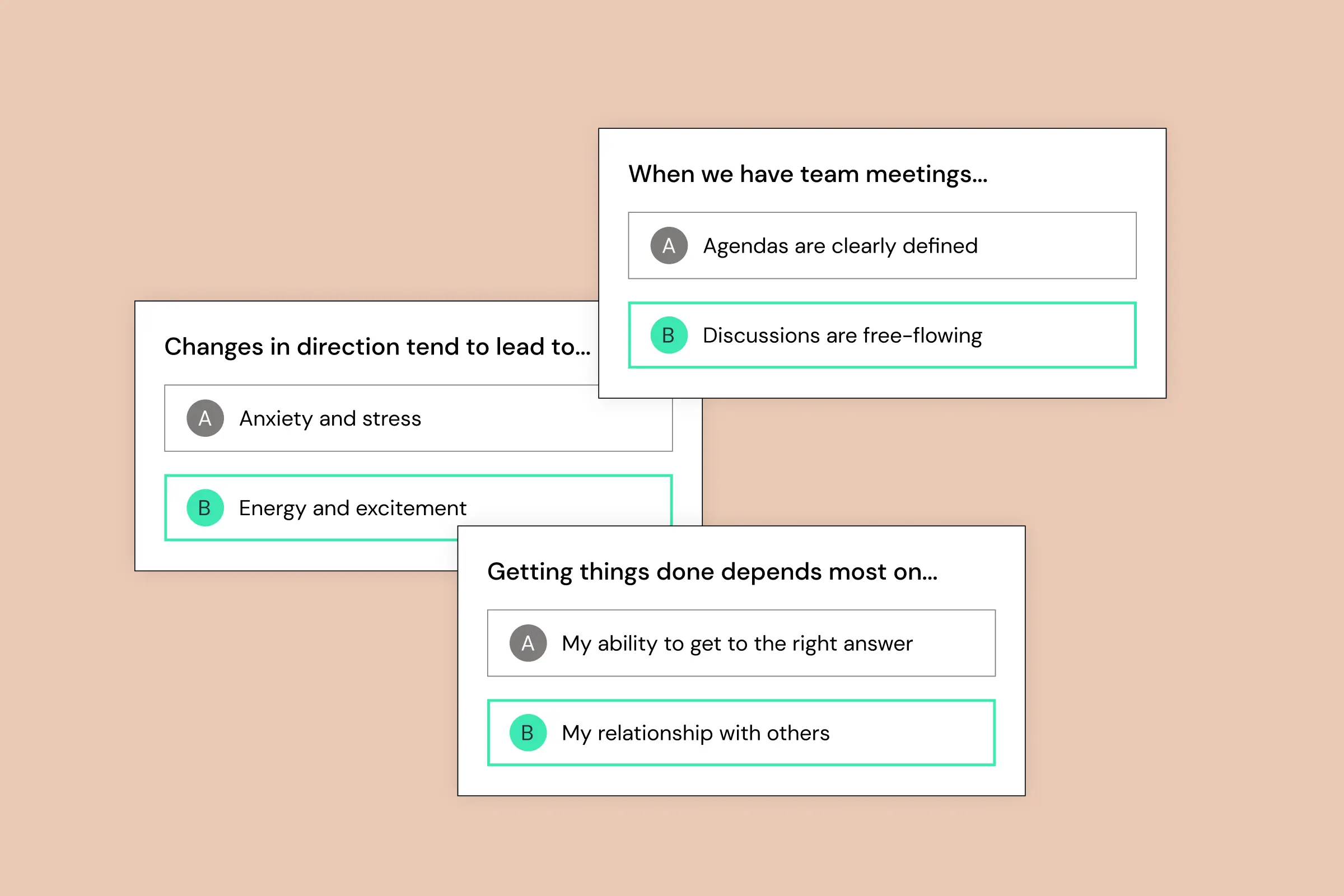

.png)
